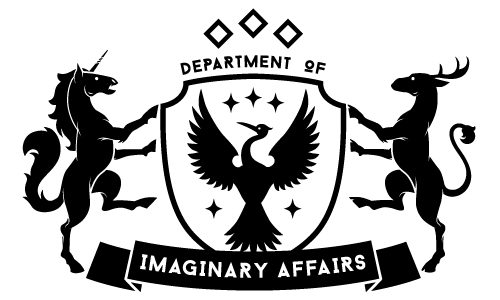The Department of Imaginary Affairs is situated on the land and waterways that have known human activity for thousands of years, long before it was ever called Canada. We are extremely privileged to be able to live and work on this land and owe gratitude and thanks to every caretaker of the land – past, present and future. We operate on the land within the Dish With One Spoon Covenant. This agreement made amongst Indigenous Nations governs how to share the resources that the land and water provide. At the heart of the agreement is the image of a single dish that holds all the bounty and one spoon to draw from that dish. The agreement that everyone will take only what they need, always ensuring that something is left for those who follow. The Dish With One Spoon agreement remains in effect to this day. We are all responsible to live by these terms.
Many Indigenous Peoples refer to North America as Turtle Island. The story of Turtle Island is one of identity, belonging, origin, and being connected to the land we live on. In this narrative, the story tells us that the world was once entirely flooded and that to make the land we live on today, sacrifices were made. While many animals tried, stronger and braver animals, it was Muskrat that dove down to the bottom of the great sea and gave their life for a single bit of mud. It was then that Turtle who offered their back for the land to be formed.
In our work of understanding our roles and responsibilities to being caretakers of the land, we work to recognize the ways in which we have been colonized and can therefore be decolonized.
“Decolonization is not a label that can be attached to pre-existing social justice strategies in the hope of absolving non-Indigenous organizers of guilt.” (Dismantling Colonialism, Building Understanding, Mosaic Institute)
We recognize the humility required to examine our conditioning and to not shy away from feelings of guilt, shame and discomfort that pull us back towards the status quo.
“In total, 13 of the 94 Calls to Action have been completed since 2015. That is a completion rate of 1.625 Calls to Action per year,” says the report. “If Canada continues at this pace, it will take another 58 years until the Calls to Action are completed, meaning that Indigenous peoples will have to wait until 2081 for reconciliation.” (National News)
This is an ongoing and active practice.
Solidarity Statement
In our pursuit of equitable futures, we hold the tension of idealism of what we want to exist in the world and where we are today.
We imagine futures where nobody is given more love, or is at greater risk of harm, based on the colour of their skin, where they are from, what language they speak, what religious beliefs they hold, who they love, how they look or how they navigate the world.
“No one is free until everybody’s free.” – Frannie Lou Hamer
We know this is not the world we live in today.
We recognize that saying we stand in solidarity with others is not the same as actually doing the work to dismantle the systems of oppression which strengthen and reinforce inequities.
We understand the deep responsibility of being in good relations, especially with Black and Indigenous communities requires trust, patience, reciprocity and humility.
It is our commitment through this solidarity statement to recognize how we show up as individuals and as an organization in the work of imagining equitable futures and dedicate a portion of our resources to continuously learning, unlearning and relearning what it means to strive for equity.
We challenge our colonial conditioning to perform perfectionism in the work of solidarity and practice releasing ourselves from the characteristics of white supremacy that harms us all.
“Solidarity is an uneasy, reserved, and unsettled matter that neither reconciles present grievances nor forecloses future conflict.” (Decolonization is not a Metaphor, E. Tuck & K.W. Yang)
We honour and acknowledge the endurance required to stand up for what we believe in and to chart a path towards equitable futures. We encourage and invite our peers within the nonprofit sector to do the same.
This is a part of our ongoing work and we reflect from time to time on our blog at #thisisimaginationatwork.
